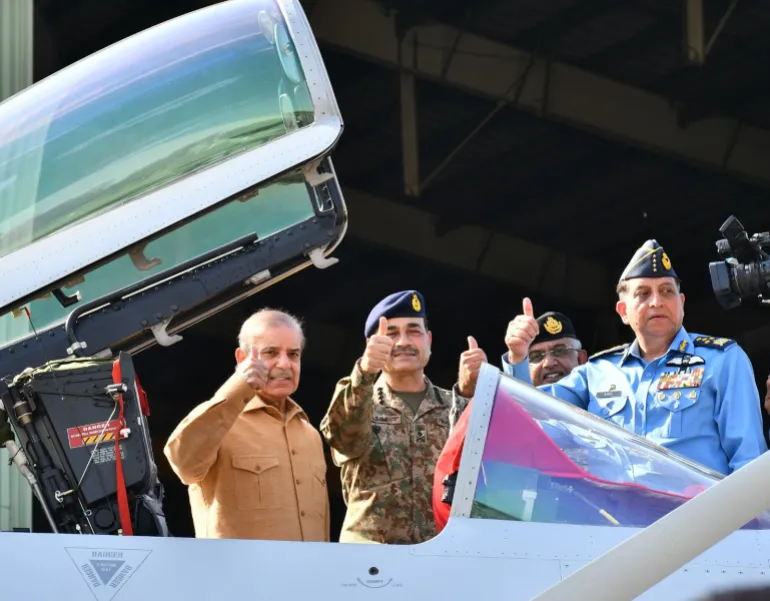Pakistani military’s creditable performance in the three-day air battle with India has significantly boosted national morale, temporarily overshadowing the country’s protracted political conflicts and economic distress.
The conflict has also rehabilitated the image of Prime Minister Shehbaz Sharif’s government, previously derided by jailed opposition leader Imran Khan as “selected” rather than “elected.” The ruling coalition and opposition have momentarily set aside their hostilities, united by the May 2025 war.
The armed forces, already a dominant force in Pakistani politics, have further solidified their influence following the conflict. While the Pakistan Air Force played a decisive role, it was Army Chief General Asim Munir who was elevated to the rank of Field Marshal—a rare five-star distinction. Air Chief Marshal Zaheer Ahmed Babar Sidhu, in contrast, received only a service extension, the duration of which remains unspecified.
Munir’s promotion was formalized via a Ministry of Defence notification citing his “exemplary courage and leadership” in coordinating Pakistan’s war strategy, culminating in what the government termed a “historic victory.” The decision was reportedly endorsed by both PM Sharif and President Asif Ali Zardari.
Political implications: Cementing the Sharif-Munir axis
Analyst Ayesha Siddiqa notes that Munir’s elevation underscores the Sharif government’s alignment with the military establishment—a move with far-reaching political consequences. As army chief, Munir has been instrumental in sidelining Imran Khan’s PTI and maintaining Khan’s imprisonment since 2023. His promotion likely aims to consolidate the Sharif-Munir alliance, further marginalizing Khan’s faction.
Khan’s supporters, both domestically and abroad, have reacted cautiously, with some sarcastically dubbing Munir a “Failed Marshal.” Given Khan’s bitter accusations—blaming Munir for his arrest and alleging military overreach—the promotion dims prospects for his release. The rift traces back to Khan’s tenure as PM, when Munir, then ISI chief, was abruptly replaced after exposing corruption allegations against Khan’s wife, Bushra Bibi.

Ideological and strategic shifts
Munir has openly embraced Pakistan’s Islamist ideological roots, invoking Jinnah’s Two-Nation Theory to frame India as an eternal adversary. His rhetoric aligns with the Pahalgam terror attack in April 2025, which triggered the brief but intense India-Pakistan air war. Observers like M.J. Akbar argue that Munir’s speeches laid the groundwork for escalating tensions, legitimizing the military’s expanded political role.
Under Munir, the Pakistan Army may adopt a more overtly jihadist posture, reinforcing its anti-India stance. Dialogue on Kashmir appears unlikely, with China’s backing ensuring Pakistan’s hardline position remains unshaken.
India’s response: A gathering storm
India, under PM Narendra Modi, has adopted an equally uncompromising stance. Modi’s declaration that “terror and talks cannot coexist” signals a freeze on diplomacy and trade, with threats to revoke the Indus Waters Treaty. The government has framed the conflict as part of a broader Hindutva-driven nationalism, vowing retaliation for future attacks.
Modi has hinted that Operation Sindoor—India’s military response—is merely “suspended,” not concluded. With both nations likely rearming and refining strategies, another clash within six months seems plausible.
The road ahead
Pakistan’s military will further entrench its control over domestic and foreign policy, while India’s BJP may leverage nationalist sentiment to shore up electoral support, particularly in upcoming state polls like Bihar.
The Munir-Sharif consolidation ensures short-term stability but deepens civil-military imbalances. Meanwhile, India’s hardening stance sets the stage for prolonged hostility. As both nations recalibrate, the spectre of another conflict looms—one with even higher stakes.


